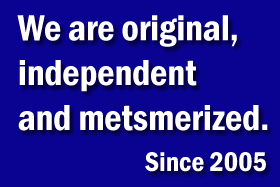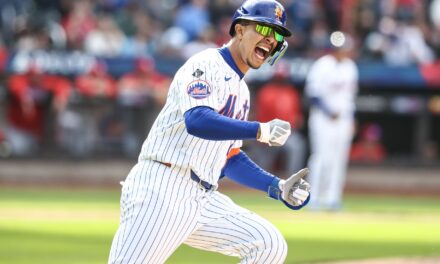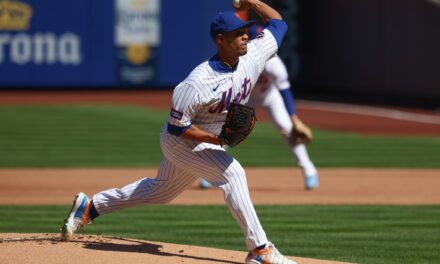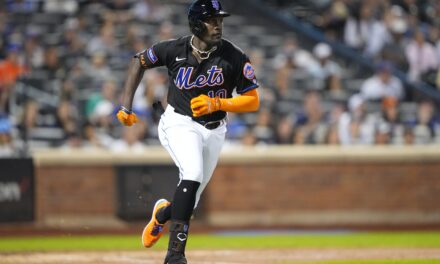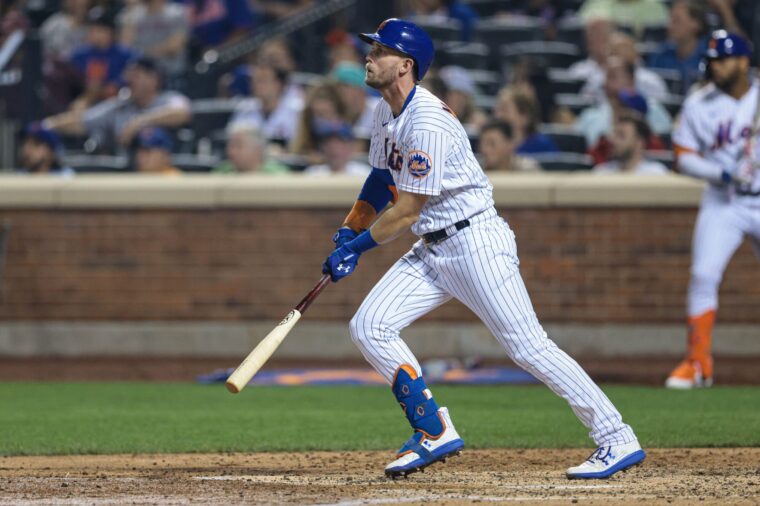
Credit: Vincent Carchietta-USA TODAY Sports
Let’s lay one thing out on the table, almost anyone is fair game trade bait if the juice is worth the squeeze. If the Dodgers put Walker Buehler on the block for Jeff McNeil (hyperbole alert), you listen. That being said, there’s been a lot of chatter recently about McNeil seemingly expendable for a potential upgrade at pitching. And while it’s always worth listening to what teams have to offer, here are five reasons not to give up on McNeil just yet.
Rat/Racoon… Really?
Whatever circus took place in the clubhouse tunnel on that fateful Friday night on the 7th of May, 2021 may forever be a mystery. The optics of the todo-turned-rat/racoon presser certainly shed poor optics on whatever friction was bubbling over between the relatively new double play combo of Jeff McNeil and Francisco Lindor. That being said, I’m not about to give up on McNeil based on rodents and rumors.
A worse fate would be shipping McNeil off over such a spat and him hitting .340 in St. Louis or 30 home runs at Great American Ball Park. McNeil and Lindor are (or at least, should be) consummate professionals each with a mutual competitive hunger. I would rather bet on them getting on the same page than lose a capable homegrown multi-tooled baller in McNeil.
Assets
In the dark, dismal days under the Wilpon regime, trading for assets was virtually the only means of acquiring prime talent. In the sunnier days of Uncle Stevie, there’s an open wallet to bring in pieces. If there’s still a few simoleons in the vault after the slew of signings, most notably Max Scherzer’s $130,000,000 layout, why not round out the rotation by bringing in free agent lefty Carlos Rodon instead of parting with a resource like McNeil?

Lest We Forget
Remember when Jeff McNeil was good? It was not that long ago. It was only a few years ago when we all almost lost it when he was nearly included with Jarred Kelenic in the Diaz/Cano deal. Has it really gotten that bad that we’re ready to cut bait? In his short career, there are proven numbers stashed away that are noteworthy and intimate a return to production. McNeil’s only one year removed from three straight years of batting over.300 along with an OPS of at least .830. Between 2018-2020, his lines were .329/.381/.471, .318/.384/.531, and .311/.383/.454, respectively.
While we’ve all witnessed the narrative of Jeff shifting from contact to power, there’s still consistency with his bat-on-ball ability. His numbers dipped in 2021 (.251/.319/.360), partly due to injury. He’s already shown some of his upside, putting a 5.1 WAR season together in 2019, so why would you want to move a player coming off his worst statistical year likely yielding a lesser trade return?
Versatility
As has been discussed in many a Mets fan’s (including last week’s installment of this column) desire to bring in Kris Bryant due to his positional versatility, much of Jeff McNeil’s value has grown for the same reason. While McNeil came into the bigs to serve mostly as a second baseman, he was soon forced into a utility role when Robinson Cano was acquired in the controversial trade of the Van Wagenen era. McNeil soon after bounced around between second, third, left field and right field. And while a learning curve was apparent at times, he seemed up to the task no matter where positioned. Keeping this type of swiss army knife on the roster can only add to new manager Buck Showalter’s lineup flexibility.
Cost-Friendly / Team Control
While there are still variables subject to change once this muddy CBA/lockout is behind us, as of right now McNeil is under Met control through the 2024 season. While this adds to his potential trade value, it also contributes to his current value as a Met. He’ll likely make less than $3,000,000 in 2022 and unless he jumps into MVP territory (which would undoubtedly be a good problem), his 2023 and 2024 salaries should prove manageable. In fact, if Jeff puts forth some of his earlier numbers, one could make the case more for contact extension than an exportation.
